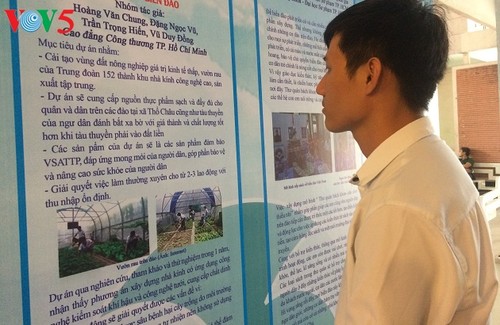 Dang Ngoc Vu and an introduction of his "Vegetable gardens for islands" project. Dang Ngoc Vu and an introduction of his "Vegetable gardens for islands" project. |
Dang Ngoc Vu was stationed on Truong Sa Archipelago in 2013. During that time the islands often faced imminent combat and entire areas, including vegetable gardens, had to be leveled.
In their shelter-pits, the soldiers lived on canned food, bean sprouts, and young leaves. Vu and his comrades longed for chilies, eggplants, and vegetables to enliven their diets.
Vu says he nurtured a plan to one day build a modern vegetable garden for his mates, adding: “There was a serious shortage of vegetables that caused many of my comrades to be hospitalized. I became determined to do something for the islands, to at least make a vegetable garden for the soldiers.”
In February, 2015, Vu returned to the mainland to study at the Ho Chi Minh City Industry and Trade College. He and members of the school's Science and Technology Club began to research and design models for high-tech "Vegetable gardens for islands".
A pilot project on Tho Chu Island in Kien Giang Province, said Vu, takes advantage of local natural light and modern hydroponic technology to maximize vegetable yields while conserving energy, water, and human effort. The system will save the army and islanders thousands of US dollars annually in vegetable costs.
An advocate of safe agriculture, Doan Thanh Phong of Phu Nhuan district, Ho Chi Minh City, has a particular interest in Vu’s project. Phong says applying advanced cultivation techniques like this will have a big impact on remote islands.
"’Vegetable gardens for islands’ is a great project because it is adaptable and improves the lives of soldiers and other residents of islands whose natural conditions are harsh,” Phong explains.
The model was praised for its feasibility and humanity by a program to mobilize ideas for green islands jointly organized by the Vietnam Students Association in Ho Chi Minh City and the Youth Science and Technology Development Center.
The project was selected in August for a pilot investment on Tho Chu Island. With an initial investment of 1,800 USD, Vu will make his dream of a vegetable garden a reality on an area of 50 square meters.
Lam Dinh Thang, President of the Vietnam Students Association in Ho Chi Minh City, said: “The project’s author has proven his deep understanding of the practical situation on the islands and of hydroponic cultivation in the very harsh conditions of Tho Chu Island. We have decided to invest in the project because we find it highly feasible.”
Vu says he will now try to raise money to replicate the model on other islands.